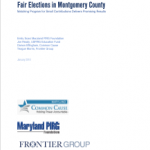
Fair Elections in Montgomery County
Matching program for small contributions delivers promising results
This report analyzes the fundraising data released after the first reporting deadline for candidates in the 2018 Montgomery County elections. Candidates participating in the small donor matching program are raising money from more individual people than those who are not participating. Our review of the data concludes that:
Maryland PIRG Foundation and Common Cause Maryland

Executive Summary
“Big money” – the large donations that come from a few mega-donors and special interests – dominates current American politics, shaping everything from who runs for office to a candidate’s ability to communicate their message to the public.
But it doesn’t have to be this way. Around the country, cities, counties and states are taking action to fight back against large donors’ dominance of politics. One such effort is the Fair Elections law adopted in Montgomery County, Maryland, which provides candidates for county-level positions with matching funds if they agree to accept contributions only from small donors.
This report analyzes the fundraising data released after the first reporting deadline for candidates in the 2018 county elections. Candidates participating in the small donor matching program are raising money from more individual people than those who are not participating. Our review of the data concludes that:
- Candidates who participated in the matching program and have received money from the matching fund received 92 percent more contributions from individuals on average than non-participating candidates (611 vs. 319).
- Candidates in the matching program raised 58 percent more of their contributions from small donors (99.5 percent vs. 63 percent).
- Candidates who have qualified for matching dollars collected, in aggregate, almost 12 times as much of their campaign funding from small donors as candidates who are not participating in the program. Small donations accounted for 94 percent of total fundraising dollars raised by candidates receiving matching funds, versus only 8 percent for those not participating in the program.
Early evidence suggests that the small donor program is working. Other counties, cities and states should look to Montgomery County as an example of how to take effective and substantial action on campaign finance reform.
Topics
Authors
Emily Scarr
State Director, Maryland PIRG Foundation
Emily directs strategy, organizational development, research, communications and legislative advocacy for Maryland PIRG. Recently, Emily helped win small donor public financing in Montgomery and Howard counties, and the Maryland Keep Antibiotics Effective Act to protect public health by restricting the use of antibiotics on Maryland farms. Emily also serves on the Executive Committees of the Maryland Fair Elections Coalition and the Maryland Campaign to Keep Antibiotics Working, and the Steering Committees for the Maryland Pesticide Action Network and Marylanders for Open Government. Emily lives in Baltimore with her husband and dog.
Find Out More

Fair Elections in Maryland Counties

Our 2023 Legislative Agenda and Priorities

Testimony: Local Public Campaign Financing – Expansion to Additional Offices

